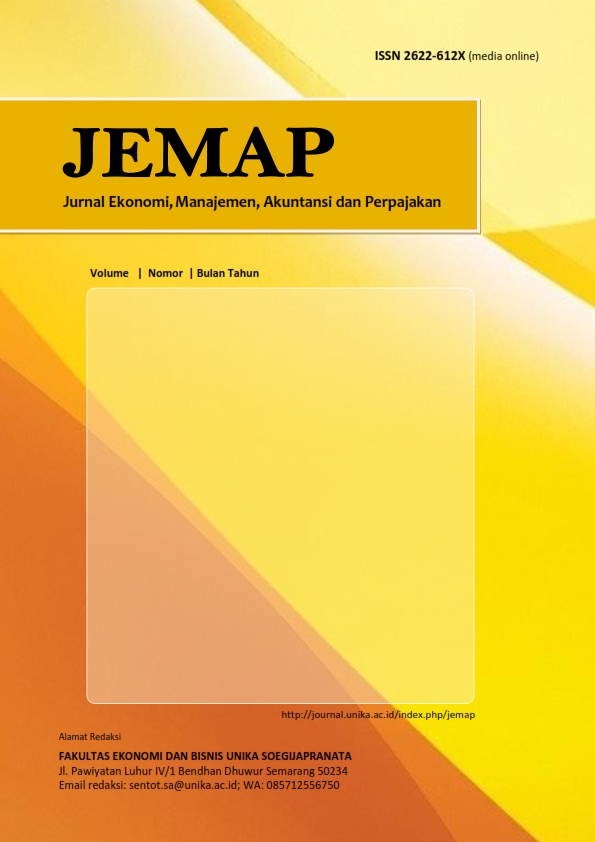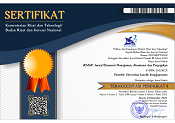Strategi Bertahan Dan Bersaing Pada Usaha Mikro Dan Kecil Kedai Kopi Di Masa Pandemi Covid-19 Di Kota Semarang Tahun 2020
Abstract
This study aims to analyze the business strategy of micro and small coffee shops in Semarang City, related to the impacts and challenges due to the Covid-19 pandemic. A total of fifty (50) coffee shop MSEs were taken as sample. The analytical tool used in this study is the analysis of Cross Tabulation and Chi Square using SPSS 20 software. The results of the study show that the survival strategy was applied by conducting online promotions to reduce physical promotion costs as well as to penetrate new market targets. Then, the coffee shop also lowered the selling price by giving discounts on the products. The competitive strategy implemented by micro and small coffee shops was to create new products which different from their competitors and provide better services according to government policies by implementing health protocols for coffee shops during the Covid-19 pandemic to increase trust in consumers. Coffee shops also implemented sales through delivery applications such as GoFood and GrabFood to add new target markets.
Keywords
Full Text:
PDF (Bahasa Indonesia)References
Abedisi, S. A., & Bakare, N. A., (2019), Survival Strategies and Sustainability of Small and Medium Enterprises in a Volatile Environment, Management Dynamics in the Knowledge Economy, 7(4), 553–570.
Akaeze, N. A., & Akaeze, C., (2017), Exploring the Survival Strategies for Small Business, Australian Journal of Business and Management Research, 5(7), 35–48.
Alves, J., Lok, T. C., YuBo, L., & Hao, W. (2020). Crisis Management for Small Business during the COVID-19 Outbreak:Survival, Resilience and Renewal Strategies of Firms in Macau. hal 1–29.
Amirullah, (2015), Manajemen Strategi Teori Konsep Kinerja, Mitra Wacana Media, Jakarta.
Arsyad, L., & Kusuma, S. (2014). Ekonomi Industri. UPP STIM YKPN. Yogyakarta.
Badan Pusat Statistik, Data Perkembangan UMKM di Indonesia Tahun 2015 – 2018, diakses dari https://www.bps.go.id/subject/170/industri-mikro-dan-kecil.html pada tanggal 7 Juni 2020.
Çetindas, A., & Özturk, O., (2020), Competitiveness During Covid-19 Pandemic: New Product Development and Supply Chain Agility, Gaziantep University Journal of Social Sciences, 19(COVID-19 Special Issue), 308–325.
Derry, A., (2021), RENCANA BISNIS “INDONESIAN’S COFFEE SHOP”, Jurnal Manajemen Bisnis Dan Kewirausahaan, 5(2), 112–117.
Fredland, J. E., & Morris, C. E., (1976), A Cross Section Analysis of Small Business Failure. American Journal of Small Business, 1(1), 7–18.
Hamali, A., (2016), Pemahaman Strategi Bisnis dan Kewirausahaan, Kencana, Bandung.
Kukanja, M., Planinc, T., & Sikošek, M., (2020), Crisis Management Practices in Tourism SMEs During the Covid-19 Pandemic, 53(4), 346–361. https://doi.org/10.2478/orga-2020-0023
Madeira, A., Palrão, T., & Mendes, A. S., (2021), The impact of pandemic crisis on the restaurant business. Sustainability (Switzerland), 13(1), 1–13.
Rua, O., França, A., & Fernández Ortiz, R., (2018), Key drivers of SMEs export performance: the mediating effect of competitive advantage. Journal of Knowledge Management, 22(2), 257–279.
Sengul, M., (2018), Organization design and competitive strategy: An application to the case of divisionalization. Advances in Strategic Management, 40, 207–228.
Singarimbun, M., & Effendi, S., (1989), Metode Penelitian Survai, USAID, Jakarta.
Turner, S., & Endres, A., (2017), Strategies for Enhancing Small Business Owners’ Success Rates, International Journal of Applied Management and Technology, 16(1), 34–49.
DOI: https://doi.org/10.24167/jemap.v5i1.4163
Refbacks
e-ISSN 2622-612X | View My Stats







